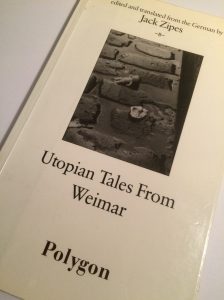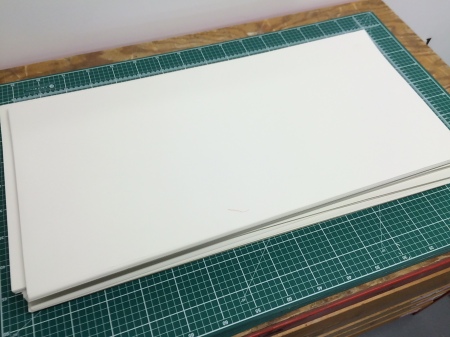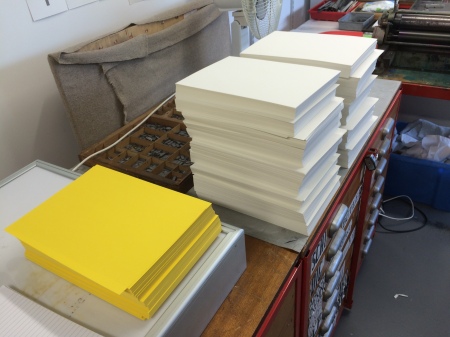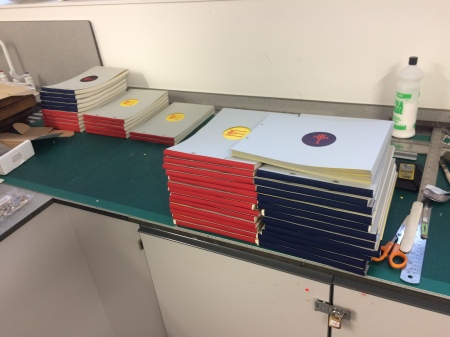After more years than Barrie would like to admit to, Utopian Tales/Utopische Märchen is finally in print, and copies are now in the post to the contributors.
The never-ending story starts in 1987 – at the Chelsea School of Art, whilst he was learning the joys of typography, magazine design and letterpress. The Chelsea School of Art opened his eyes to a great many other things too – music, dance, literature, theatre. It was an education in the arts in the broadest sense. Through the recommendations of his tutors, particularly Frances Corner, Rob Mason, Jon Newman and Dave Strickland, he discovered (amongst many other things) the work of Kurt Schwitters and the writings of Jack Zipes, which have led directly to the blog post that you are just about to read.
Some ten years after graduating, he was living and working in Edinburgh, and was lucky enough to freelance for Polygon Books. As part of getting to know the imprint, he was allowed his pick of their back catalogue, including Polygon Sigma – which according to the intriguing blurb on the flyleaf was ‘a series of books which challenge the barriers between disciplines. It will include weird fictions, half-truths, plagiarisms, anarchisms, aphorisms and…’
He never found out what the ‘and’ was, as that was where the statement finished, but one of their books in particular caught his eye. It was called Utopian Tales from Weimar and was edited and translated from the German by none other than Jack Zipes. What’s more, it contained two fairy tales by Kurt Schwitters. It just couldn’t get any better.
And of course, it didn’t. The book was originally published in America and it was photo typeset. It appeared to have been designed between the end of paste-up and the beginning of the Macintosh revolution. The text was quite dense, a condensed sans-serif, on a tight leading, and no matter how many times he picked it up to read it, something about the typography and design defeated him. Utopia always remained out of reach.
At various points when he was teaching in Edinburgh and Glasgow, Barrie would lend the book to students as research for their projects, but whoever the reader, it always seemed to be a hard book to engage with. Wonderful though the content was, the typography and layout just lacked readability.
In 2005, Jantze and Barrie had moved down south and he was teaching at Lincoln School of Art – making Artists’ Books as part of The Caseroom Press, as well as continuing to freelance. One of his clients was the Scottish Poetry Library, and at the time he was working on a series of books for them. One book in particular, How to Address the Fog: XXV Finnish Poems 1978–2002 seemed to be going through an endless series of corrections (which in turn led him to make to another book, The Ghost in the Fog, but that’s another tale). During a particularly trying set of alterations – as he recalls, it included an argument between two translators as to whether a series of ‘o’s should have a ‘^’ or not – he looked up to see, on his bookshelf, his copy of Utopian Tales from Weimar, and he thought, ‘now that I’m working as part of an Artists’ Book collective, I could maybe make a new version. A better version.’
So, Barrie searched the web for Jack Zipes, found an e-mail address and wrote to him to ask if he’d consider working on a new edition of it. Much to his surprise, Jack wrote back, said that he was going to be in London and asked if Barrie fancied meeting him for lunch?
So they met, discussed Utopian Tales, Kurt Schwitters, Gianni Rodari and many other things, and as a result, Philippa Wood, Brian Peacock and Barrie started working on a number of projects based around Jack’s translations – these became Lucky Hans and Other Merz Fairy Tales (published by Princeton University Press), Tales to Change the World, The MerzBox, The Good Man, The Onion MerzPoem No. 8 and Fairy Tale, all published through The Caseroom Press.
But of course, what he’d really wanted to publish was Utopian Tales.
The first problem was that none of the text matter existed digitally. Jack had originally researched the book in East and West Germany back in the early 1970s and had photocopied the stories at the time, ready to translate when he returned home. These were quite ‘soft’ copies, often from poor quality photocopiers and had hand written notes where the copied text was illegible.
The only copy for the English translations was that in the Polygon Sigma book itself.
So. The first task was to scan the entire book, run it through Optical Character Recognition (OCR) software and create a new clean digital file. This was time consuming, but fairly straightforward. The text matter was good enough quality to be picked up fairly well and required very little editing.
The German texts were a different story. The tales published after 1941 were usually set in sans serif, but those before that tended to be set in blackletter. The scanning software had a language option, so it could recognise German words, but even the sans serif stories were only partially successful. The age and poor quality of the copies often meant that the OCR didn’t pick enough information up and the stories needed to be transcribed letter by letter (Barrie doesn’t speak German) and typed in to form the final digital copy (He can’t touch type either, so this took a while).
The blackletter script was impossible to scan at all and each of those stories needed to be typed in, in their entirety, letter-by-letter, word-by-word. And, to add to his woes of not speaking German and not being able to touch type, the forms of blackletter script are fairly unfamiliar. As Zuzana Licko said back in 1990, ‘you read best what you read most’.
So, there were many, many nights of slowly typing in texts, half of which barrie could read, and half that he couldn’t. Luckily Jack was very happy to re-proof-read his original translations, and Ken Cockburn, a long time collaborator, proof-read, amended and – on occasion – completed the missing parts of the German stories, working back from Jack’s English texts.
Finally, the text matter for the book was complete and all the illustrators and artists began to produce varied and delightful works for each of the English and German versions of the stories. He really cannot thank them enough, both for their contributions and their endless patience.
Eventually, in the Summer of 2007, Utopian Tales/Utopische Märchen was ready to go to press.
The project had been given the go-ahead by the University; it was deep in the middle of the Research Assessment Exercise and, although the Head of Research at the time seemed to have had little truck for Graphic Design as a viable source of ‘research’, it was grudgingly agreed that Jack and Kurt carried the day and the book would be ‘reffable’.
It just couldn’t get any better.
And of course, it didn’t.
In a Series of Unfortunate Events, the funding was lost, and that was that. The book was dead and Utopia was further away than ever before.
Barrie contacted everybody to let them know what had happened, to apologise for the setback, and to say that he would continue to try and find a way to publish the book. And to be honest, it’s been on his mind ever since. Every so often he’s tried to raise funding for it to go to press, or to make an ‘in-house’ edition, but my attempts always came to nothing.
Which is where we are now. In 2015 Barrie finally realised that he has the methods of production that he needed to make the books. After a few false starts with the Glue Binder and some dead-end format changes, he made a dummy that he could produce in a very limited edition. He contacted everyone to get updated biographies … and found out that a few folk had forgotten they’d ever contributed in the first place.
The first job – taking lots of big bits of paper and making them into…
… lots and lots of smaller bits of paper
The production line in progress.
It was quite a daunting, and time consuming task. Most of the Summer has seen Barrie trimming, cutting, folding, sticking and collating all the various elements that make the books up.
The books getting their last trim on the guillotine.
Ready to ship. Only 9 years later than expected.
But. Finally. Wonderfully. Thankfully. Here it is. Utopian Tales/Utopische Märchen. With a heartfelt thank you to all the illustrators for their work, their patience, and their support, here is the most ambitious book Barrie had never published. Utopia at last.
We shall leave you with a very apt quote from Jack Zipes himself.
‘Inevitably they find their way into the forest.
It is there that they lose and find themselves.
It is there that they gain a sense of what is to be done.
The forest is always large, immense, great and mysterious.
No one ever gains power over the forest,
but the forest posses the power to change lives and alter destinies.’








Leave a comment